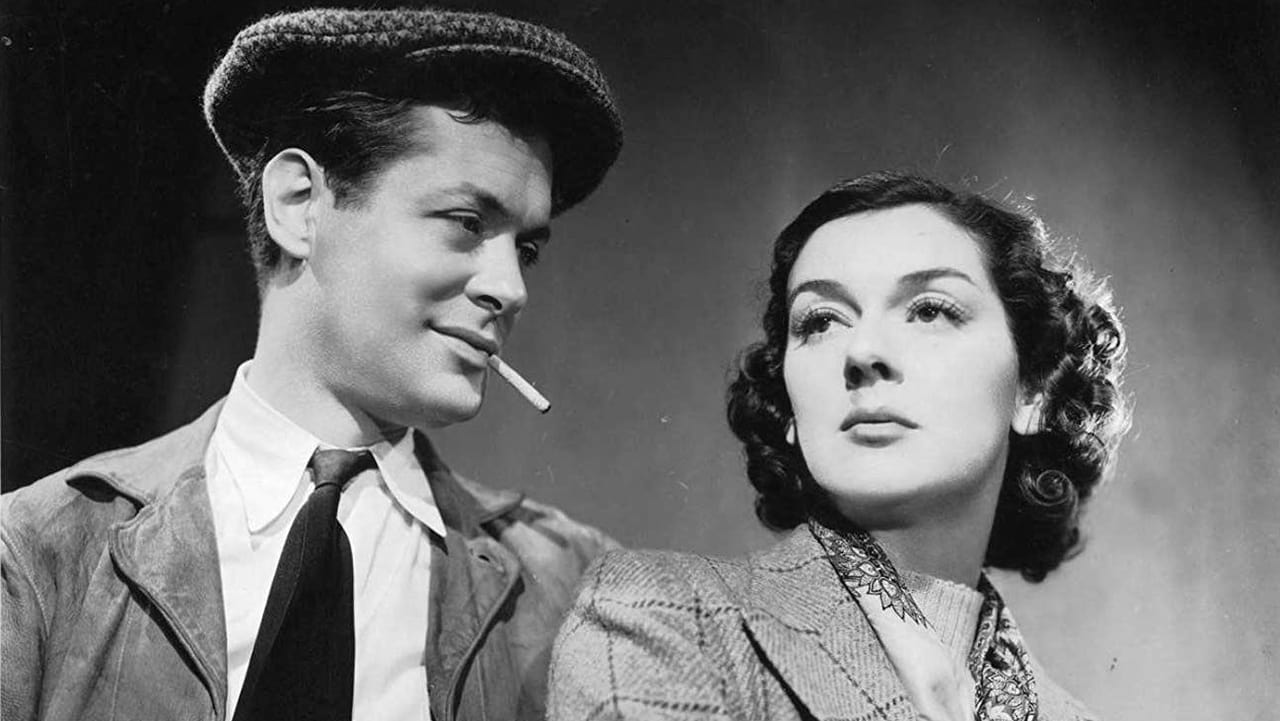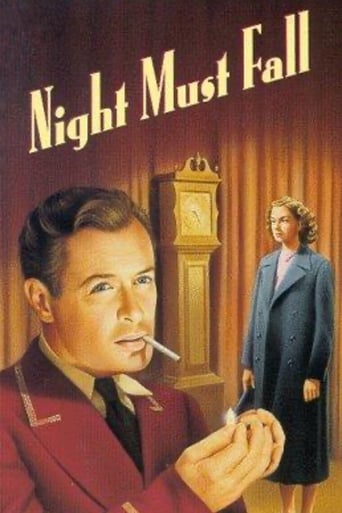

"Night Must Fall" was a very offbeat murder thriller for MGM in 1937. It was produced for the main reason that the Emlyn Williams play was a great popular success on both sides of the Atlantic. It may have flopped at the box office for several reasons but certainly not for lack of quality: the acting is superb (the US actors actually making an effort to sound British alongside national British treasures like Dame May Witty, Kathleen Harrison and E.E. Clive), the pacing is vivid and the dynamic music score (by the almost forgotten Edward Ward) was nothing if not prophetic of things to come. In spite of its occasional staginess and theatricality (yes, there is a difference between the two), it was very audacious in bringing adult themes and deep motivational analysis to film narrative, a lesson that wouldn't be lost on the later Hitchcock and a host of film noir and horror directors and writers on both sides of the pond. Hitchcock had used Williams' talents as a journeyman providing additional dialogue to his "Man Who Knew Too Much" but certainly could not afford such a hit as this play with the British film budgets of the time and would certainly have cut deep into its Shakespearian speeches. The film got past the censors in the first place because, to Americans, anything British was considered "quaint" and therefore acceptable - even when the plot almost gets away with murder. Still, its preoccupation with questions of social class, sociopathy, sexual attraction and the slightest hint of a happy end must have been quite a shock to the system for the British movie-going public. It is worth mentioning that this film (and its remake) was banned outright in Finland - where nights are very long indeed - as both outrageous to community standards and too horrific for Scandinavian nerves. Nowadays, there is a heavy metal band fom Finland called "Night Must Fall". In conclusion, this is a film that set up several precedents which have been emulated all through the rest of the XXth century, which makes it an unrecognized cinema masterpiece. Another way of sizing up its brilliance is comparing it to its 1963 remake, which fails in almost every respect.P.S.: The entire film is available on YouTube.
... View MoreIn an English village, roguishly Irish Robert Montgomery (as Danny) worms his way into the household of wealthy hypochondriac May Witty (as Mrs. Bramson). Charmed by Mr. Montgomery's fawning attention, Ms. Witty hires him as her wheelchair-pushing companion. Meanwhile, police search the countryside for a man who has decapitated another woman. Witty's beautiful straight-laced niece, Rosalind Russell (as Olivia Grayne), suspects Montgomery is the killer, and wonders if Witty is next. Yet, Ms. Russell is strangely attracted to Montgomery, even more than handsome lawyer Alan Marshal (as Justin Laurie)."Night Must Fall" entertains greatly due to the Oscar-nominated "Best Actor" performance from Montgomery; he didn't get many roles like this one, but sure knew what to do with it when he had one. At the time, Montgomery served as a romantic attachment to MGM's female leads; here, he shows he can carry a film with the best of them. Russell plays a second fiddle just as well, and Witty thankfully preserves her presence on film; nominated for a "Best Supporting Actress" award, Witty is simply marvelous. The film made several year-end honor rolls, topping the "National Board of Review" as "Best Picture" of 1937.******** Night Must Fall (4/30/37) Richard Thorpe ~ Robert Montgomery, May Witty, Rosalind Russell, Alan Marshal
... View MoreDame May Witty is a bad-tempered wheelchair-bound old woman. She's attended by her niece, Rosalind Russell, a sullen and repressed woman who keeps her eager suitor, Alan Marshal, at arm's length. He's a lawyer in the city, while Witty and Russell live in a woodland cottage. There are two women who serve as day maids. Nota bene: That's four women alone in an isolated house, with two of them gone by nightfall. Always a great set-up for a slasher movie.Then Robert Montgomery shows up. He's more of a caricature than a character. He looks cocky. A cigarette dangles from his lips and he keeps his thumbs hooked in his trouser pockets. He wears this weird topper, a flat hat wider than his head, like a woolen dinner plate.But, man, is he bewitching. He's always cheerful, as quick and perceptive about people as a particularly savvy shrink. He has an Irish accent. He's candid and forthright about himself and what he sees in others. He's loaded with this fey charm and it's easy for him to worm his way into the brutal old lady's graces so that, after some initial protests, she happily hires him as something between a personal attendant and a son.It isn't as though Robert Montgomery didn't have problems, though. Chief among them are the facts, which emerge only point by point during the story, that he's a blatant liar and a sneaky murderer who totes the head of his latest victim around in a hatbox with him.The play was written in 1934. A bit more than thirty years earlier Queen Victoria was on the throne. Victorian England was notorious for its repression of everything that could possibly be defined as "improper", meaning mostly sex and violence but also bad manners and a careless regard for class distinctions. Furniture legs were covered with little draperies. A chicken's "breasts and thighs" became "white and dark meat." It's the kind of atmosphere in which evil could pop unexpectedly, like a pierced carbuncle, an atmosphere that could produce Stevenson's "Doctor Jeykll and Mr. Hyde" or an Alfred Hitchcock.The play's author, Emlyn Williams, was born in 1905 and some of these values are carried over into his plot. Montgomery's character, Danny, smilingly admits that he's always "acting", as if eyes were staring at him. Every once in a while, though he doesn't tell Russell or anyone else, the zit pops and he dismembers somebody.Montgomery does a fine job with Danny. He always appears gawky. His movements are sudden and jerky, and his speech comes in bursts. Eventually, along with Russell, the viewer realizes that Danny is not merely acting but overacting. He races around singing and whistling and flattering the grouchy matron. He pushes her wheelchair too quickly. Everything he does is in fits and spasms.Russell's part is pretty complicated. She has to begin as a buttoned-up spinster who resents the lower-class Danny, but then becomes interested in him, half repelled and half attracted sexually, so much so that she saves his bacon when the police begin to suspect him of a local murder.Danny is the sort of guy who, if he didn't exist, would not be necessary to invent, but he does accomplish some good unwittingly. He opens up Rosalind Russell's passions and causes to her act out her desires.The movie is a little slow. It's not the action-filled mystery with cheap effects that we've become used to. The pace picks up towards the end. And it's not without weakness. The cynical and tough old lady finds herself alone in the house at night and instantly turns into a quivering mass of Jello. There's been no indication that this transmogrification from brick wall into vulnerability was coming -- or was even possible.But, that aside, it's a neatly drawn picture of aborted predation, of character and the evolution of character.
... View MoreSomewhat forgotten, uniquely entertaining "thriller" about the happenings of an old English cottage when news of a missing then discovered murdered woman surrounds household. Rosialnd Russell, looking very prim and proper(and Oh! so young!), gives a good performance as a bullied niece with loads of imagination, a repressed sexual bent, and some genuine ambivalent feelings toward life, death, and the whole notion of what is exciting and what is dull. She takes orders from the wonderful Dame May Witty giving a grand performance as an imperious woman in a wheelchair trying to clutch on to anything in her life that will still give it meaning. Her household is visited upon by a young man that has been seeing one of the servant girls - Robert Montgomery - and he manages through his "charm" to worm his way into her home. We know at the very beginning that his intentions are not noble as we see him talk about Witty's wealth and spy on her as she locks away her valuables. Witty adopts Montgomery, now working in her home, as a kind soul full of funny anecdotes and good will. Russell knows differently but either is unwilling to accept what kind of person Montgomery is or is excited by that very same kind of person he may be. The murder looms the entire time in the background. Richard Thorpe does one heck of a good job infusing this film with taut tension and gentle humour. His use of setting and cinematography in particular show great craftsmanship. He is also blessed with three strong performing leads. Witty is an absolute treasure. Russell is very good, and Montgomery gives what might be his best performance. His light Cockney-like accent is believable, and although I found his character despicable from the very beginning - that credit for making what many perceived as a charming local initially affable and then later very detestable is a credit to Montgomery's acting craft. He plays a psychopath very well indeed. Night Must Fall will not dazzle you with action sequences, nor will you even see any actual violence. The film is very talky, but wonderfully so and relies almost entirely on the dialog and the believability of the acting. Movies like this sure aren't made any more. They just involve way too much thinking.
... View More